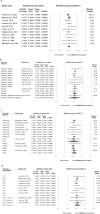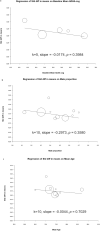Effect of N-methyl-D-aspartate receptor enhancing agents on cognition in dementia: an exploratory systematic review and meta-analysis of randomized controlled trials
- PMID: 34836972
- PMCID: PMC8626464
- DOI: 10.1038/s41598-021-02040-5
Effect of N-methyl-D-aspartate receptor enhancing agents on cognition in dementia: an exploratory systematic review and meta-analysis of randomized controlled trials
Abstract
Multiple N-methyl-D-aspartate (NMDA) receptor enhancing agents have had promising effects on cognition among patients with dementia. However, the results remain inconsistent. This exploratory meta-analysis investigated the effectiveness of NMDA receptor enhancing agents for cognitive function. PubMed, the Cochrane Central Register of Controlled Trials, and the Cochrane Database of Systematic Reviews were searched for randomized controlled trials (RCTs). Controlled trials assessing add-on NMDA receptor enhancing agent treatment in patients with dementia and using cognition rating scales were eligible and pooled using a random-effect model for comparisons. The standardized mean difference (SMD) was calculated in each study from the effect size; positive values indicated that NMDA receptor enhancing agent treatment improved cognitive function. Funnel plots and the I2 statistic were evaluated for statistical heterogeneity. Moderators were evaluated using meta-regression. We identified 14 RCTs with 2224 participants meeting the inclusion criteria. Add-on NMDA receptor enhancing agents had small positive significant effects on overall cognitive function among patients with dementia (SMD = 0.1002, 95% CI 0.0105-0.1900, P = 0.02860). Subgroup meta-analysis showed patients with Alzheimer's Disease and trials using the Alzheimer Disease Assessment Scale-cognitive subscale as the primary outcome had small positive significant effects (SMD = 0.1042, 95% CI 0.0076-0.2007, P = 0.03451; SMD = 0.1267, 95% CI 0.0145-0.2388, P = 0.2686). This exploratory meta-analysis showed a very small, positive, and significant effect on overall cognition function in patients with dementia. Studies with larger samples are needed to evaluate different cognitive domains and phases of dementia.
© 2021. The Author(s).
Conflict of interest statement
The authors declare no competing interests.
Figures





References
Publication types
MeSH terms
Substances
LinkOut - more resources
Full Text Sources
Medical

